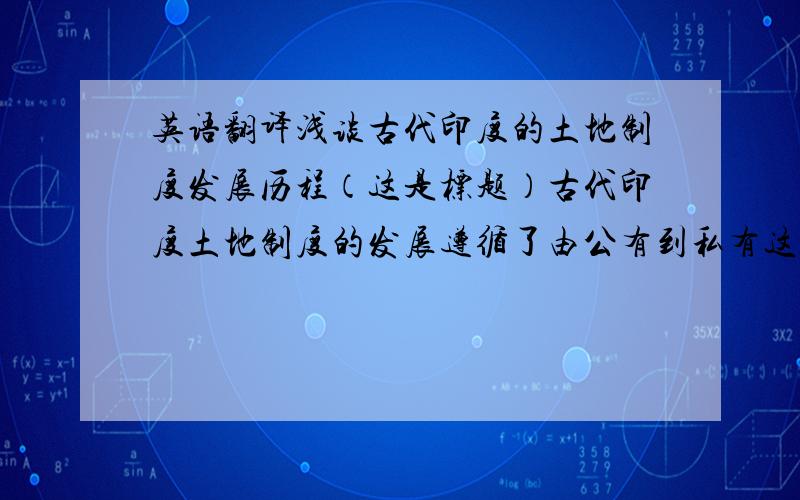英语翻译浅谈古代印度的土地制度发展历程(这是标题)古代印度土地制度的发展遵循了由公有到私有这样一个过程,但印度由于其地理
来源:学生作业帮 编辑:大师作文网作业帮 分类:英语作业 时间:2024/11/20 14:06:57
英语翻译
浅谈古代印度的土地制度发展历程(这是标题)
古代印度土地制度的发展遵循了由公有到私有这样一个过程,但印度由于其地理位置和文化发展的特殊性,并非完全的公有然后私有,而是二者相互交杂,实行公私二重制,无论任何一个历史时期,其土地制度都非一目了然,总是相互盘根错杂,在大的框架下,又各自成方圆.史前的吠陀时期,开始从游牧到定居生活转变,土地制度踏出了由公有向私有转变的第一步;孔雀王朝建立了第一个大一统的奴隶制国家,土地国有制正式形成,但实际上的占有形式又多种多样;封建化过程中,赠赐土地成了盛行的土地占有方式,寺庙占有大量的土地,地方上农村公社又长期存在着;分裂割据时期,南方从氏族社会发展到以农村公社为基础以神庙为中心的农业社会,而北方社会则稍显停滞,土地分封严重;异教文化的来到,给印度注入了新的活力,但新产生的伊克塔、柴明达尔、贾吉尔在适应的初期后,都产生了不良反应.究竟印度的土地制度将要如何变化,过去又会对现在造成怎样的影响?(这是论文摘要啊)
翻得又好又快的会补分的!至少补上30分啊~
浅谈古代印度的土地制度发展历程(这是标题)
古代印度土地制度的发展遵循了由公有到私有这样一个过程,但印度由于其地理位置和文化发展的特殊性,并非完全的公有然后私有,而是二者相互交杂,实行公私二重制,无论任何一个历史时期,其土地制度都非一目了然,总是相互盘根错杂,在大的框架下,又各自成方圆.史前的吠陀时期,开始从游牧到定居生活转变,土地制度踏出了由公有向私有转变的第一步;孔雀王朝建立了第一个大一统的奴隶制国家,土地国有制正式形成,但实际上的占有形式又多种多样;封建化过程中,赠赐土地成了盛行的土地占有方式,寺庙占有大量的土地,地方上农村公社又长期存在着;分裂割据时期,南方从氏族社会发展到以农村公社为基础以神庙为中心的农业社会,而北方社会则稍显停滞,土地分封严重;异教文化的来到,给印度注入了新的活力,但新产生的伊克塔、柴明达尔、贾吉尔在适应的初期后,都产生了不良反应.究竟印度的土地制度将要如何变化,过去又会对现在造成怎样的影响?(这是论文摘要啊)
翻得又好又快的会补分的!至少补上30分啊~

on developing process of land system in ancient India
the development of the ancient land system of India comforms to the process from public-owned to privated-owned, but because of its geographic position and the peculiarity of its cultural development,it is not transfered from complete public-owned to complete private-owned. the two are mixed and dual system of public and private is applied. its land system is not obvious in any historic period, but intermixed. and under the microscopic fram,each has its system.in the prehistoric vedic period, the living style began to shift from nomadic living to settle-down libing. the land system started the first step for shifting from public owned to private-owned. the Peacock dynasty established the first slave-owner's state. the system of land being owned by the state formed,but actually,there were variety of forms of possession. in the process of feudalization, the form of possession featured land given by god. the temples owned a large sum of land,and in specific areas,agricultural community has long been there. in the period of division and seperation, the south has developed from clan society to agriculture society that was based on agricultureal community and centered with herion, while the north was mildly lagged behind, the endowment of land was popular. the coming of heretical culture brought new vitality to india, but after the early days of adaption, the mew-fromed iqta'dar, zamindar and jalil showed negative reaction. How will the land system of india change? and what impact will the past impose on present.
the development of the ancient land system of India comforms to the process from public-owned to privated-owned, but because of its geographic position and the peculiarity of its cultural development,it is not transfered from complete public-owned to complete private-owned. the two are mixed and dual system of public and private is applied. its land system is not obvious in any historic period, but intermixed. and under the microscopic fram,each has its system.in the prehistoric vedic period, the living style began to shift from nomadic living to settle-down libing. the land system started the first step for shifting from public owned to private-owned. the Peacock dynasty established the first slave-owner's state. the system of land being owned by the state formed,but actually,there were variety of forms of possession. in the process of feudalization, the form of possession featured land given by god. the temples owned a large sum of land,and in specific areas,agricultural community has long been there. in the period of division and seperation, the south has developed from clan society to agriculture society that was based on agricultureal community and centered with herion, while the north was mildly lagged behind, the endowment of land was popular. the coming of heretical culture brought new vitality to india, but after the early days of adaption, the mew-fromed iqta'dar, zamindar and jalil showed negative reaction. How will the land system of india change? and what impact will the past impose on present.